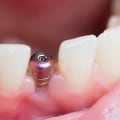There are two major health problems that give us warning signs with implants · Uncontrolled diabetes · Medicine for bone growth · The importance of. Diabetes and prediabetes can increase the risk of developing gingivitis and advanced gum disease, which can affect the success of a dental implant. In addition, diabetes reduces blood flow, makes it difficult for gums to heal and affects the immune system. All of this can cause problems in dental implant surgery and in the stability and longevity of dental implants. Gum disease can cause complications in dental implants due to inflammation and infection of the gum tissue surrounding the implant.
Gum disease can reduce the success rate of the implant and cause it to fail. If you have periodontitis or advanced gum disease, talk to your dentist about your application for dental implants. Sleep disorders, such as sleep apnea, can cause implant failure, especially obstructive apnea of the dream. This is because it has symptoms such as teeth grinding and clenching, which can lead to dental damage and the loss of natural teeth and dental implants.
The crown of an implant can crack and a screw can become loose, which can cause other problems. If you have a sleep disorder or sleep apnea, talk to your dentist or doctor about the possibility of performing a sleep study before deciding on dental implants. Our dentist also provides night guards to protect teeth and implants from nighttime teeth grinding and grinding. Hormonal imbalances are common in women, such as those experiencing menopause.
But did you know that menopause can increase the risk of oral health problems? For example, it can cause bone loss in the jaw and dry mouth, contributing to tooth decay and gum disease. However, just because you're going through menopause or other hormonal changes doesn't mean we're completely ruling out dental implants. We recommend that you call us to review your case and your specific needs so that we can find what best suits your needs. Dental implants are supposed to offer a fresh start to your smile, but if your mouth starts with an infection such as gum disease, the implants probably won't work. This inflammatory disease attacks not only gum tissue but also the jaw, which are essential for successful implant success.
If you have gum disease, your dentist must treat the condition before placing dental implants. This process for controlling gum disease can take a few months, but once your mouth is healthy again, you can trust that your new teeth will have a stable base. Dental implants may not be right for everyone due to factors such as cost, potential complications during surgery or the healing process, and maintenance requirements. In addition, some people may prefer alternative tooth replacement options, such as dentures or bridges, depending on their personal preferences. Another major disadvantage of dental implants is that they require surgery to place them.
You may think that this is a big deal, but surgery is always a health risk. The complication rate is only an average of 5 to 10%. The risks and complications that dental implants undergo include infection, damage to other teeth, delayed bone healing, nerve damage, prolonged bleeding, jaw fractures, etc. If you are willing to take these risks, dental implants may be right for you. Dental implants require the same care as real teeth, including brushing, flossing, and regular dental checkups.
Dental implants require a sufficient amount of maxillary bone to support the implant and ensure its stability. People with autoimmune diseases, such as rheumatoid arthritis or lupus, may not be eligible for dental implants because of their healing problems and increased risk of infection, and medications used to treat these disorders may interfere with bone growth and integration. People with certain health problems, poor oral hygiene, insufficient bone density or volume in the jaw, and those taking specific medications may not be eligible for dental implants. People with certain health problems or risks are advised to avoid dental implants to protect their health and prevent implant failure. Dental crowns and dental bridges are made of porcelain and can usually last the rest of your life with proper care.
Be honest with your dentist about any medications you're taking to ensure that dental implants are a good option; do your research first. Before undergoing dental implant surgery, it's critical to consider any health conditions that may cause complications. If you're looking for instant results for your missing teeth, dental implants won't be your solution. In any case, they could help cover the restoration that will be placed on the dental implant, such as the dental crown, the dental bridge or the partial or complete denture. However, according to several studies, most people report feeling less pain and swelling during and after dental implant surgery than after a tooth extraction.
It's also essential to consider certain habits and lifestyle factors that may prevent a person from meeting the requirements for receiving dental implants; let's discuss these aspects. Some oral health problems that may prevent a person from meeting the requirements for receiving dental implants include poor hygiene, periodontal disease and insufficient maxillary mass.



